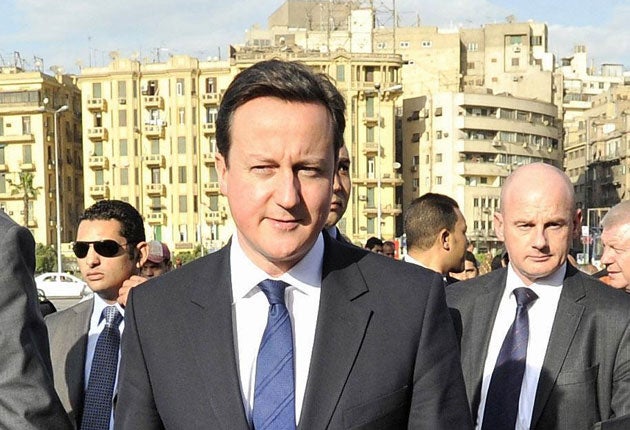Cameron attacked for Egypt visit with defence sales team in tow

David Cameron faced charges of hypocrisy last night after he arrived for a tour of the Gulf with some senior figures from the defence industry.
His long-planned visit was originally to bang the drum for British business in export markets, but has become dominated by the turmoil in the Middle East. After leaving Britain early, Mr Cameron became the first world leader to visit Egypt since President Hosni Mubarak was toppled. The Prime Minister is also preparing, in a speech to the Kuwaiti parliament today, to urge governments across the region to respond to calls for reform.
Despite the change in his agenda, Mr Cameron is still taking a large delegation from business and industry, including eight representatives of defence firms attempting to secure contracts in the Gulf states. Among them are: Ian King, chief executive of BAE Systems; Alastair Bisset, group international director at QinetiQ; and Rob Watson, regional director of Rolls-Royce.
Meanwhile, the Defence minister Gerald Howarth is in Abu Dhabi, where he is leading Britain's biggest ever delegation to an international arms fair. More than 100 UK firms are showcasing their products at the International Defence Exhibition and Conference, which is aimed at governments in the Middle East and North Africa.
Yasmin Khan, senior campaigns officer at the charity War on Want, called for the Prime Minister's "shameful" and "ill-timed" trip to be cancelled. She said: "It is deplorable that David Cameron is seeking to exploit the crisis by promoting sales of weapons and torture equipment to the region."
Sarah Waldron, campaigns co-ordinator at Campaign Against the Arms Trade, said: "The UK Government prioritises the interests of arms companies – it makes a mockery of claiming to have a rigorous approach to arms sales. People in the Middle East are dying in an attempt to get democracy and yet Cameron and other ministers are still selling weapons used to oppress them."
The Government last week revoked a series of export licences to Libya and Bahrain amid fears the equipment – including tear gas and pepper sprays – could be used for internal repression.
Mr Cameron in Cairo condemned as "completely appalling" the suppression of protests in Libya. He said: "I call on them even at this late stage to stop. People's aspirations for greater democracy, for greater freedom, for greater rights should be met with reform, not repression."
Meanwhile, in London the Libyan ambassador, Omar Jelban, was summoned to the Foreign Office to be told "in the strongest terms" of the Government's "absolute condemnation" of the use of lethal force against protesters. William Hague, the Foreign Secretary, promised that the Government would give "every possible assistance" to the estimated 3,500 Britons in Libya in helping them to leave the country.
Yet Mr Cameron was forced to defend the inclusion of defence industry representatives in the travelling party, arguing that it was "very much in Britain's interests" that the UK continued to promote defence relationships with countries in the region.
He said: "Britain has a range of strong defence relationships with countries in the region. I seem to remember we spent a lot of effort and indeed life in defending and helping to defend Kuwait.
"So the idea that Britain should not have defence relationships with some of these countries I don't understand. It is quite right that we do.
"We have some of the toughest rules on export licences and exports of arms anywhere in the world. Everything has to meet those rules."
The packed agenda saw Mr Cameron hold talks with the head of the armed forces supreme council, Defence Minister Mohamed Tantawi, and Prime Minister Ahmed Shafiq – deliberately steering clear of the Muslim Brotherhood, Egypt's popular Islamist group.
Meanwhile, the Foreign Office last night dropped its advice against "all but essential" travel to Cairo, Alexandria and Suez. A spokesman said the situation in Egypt was "much improved" following Mr Mubarak's departure.
Subscribe to Independent Premium to bookmark this article
Want to bookmark your favourite articles and stories to read or reference later? Start your Independent Premium subscription today.

Join our commenting forum
Join thought-provoking conversations, follow other Independent readers and see their replies